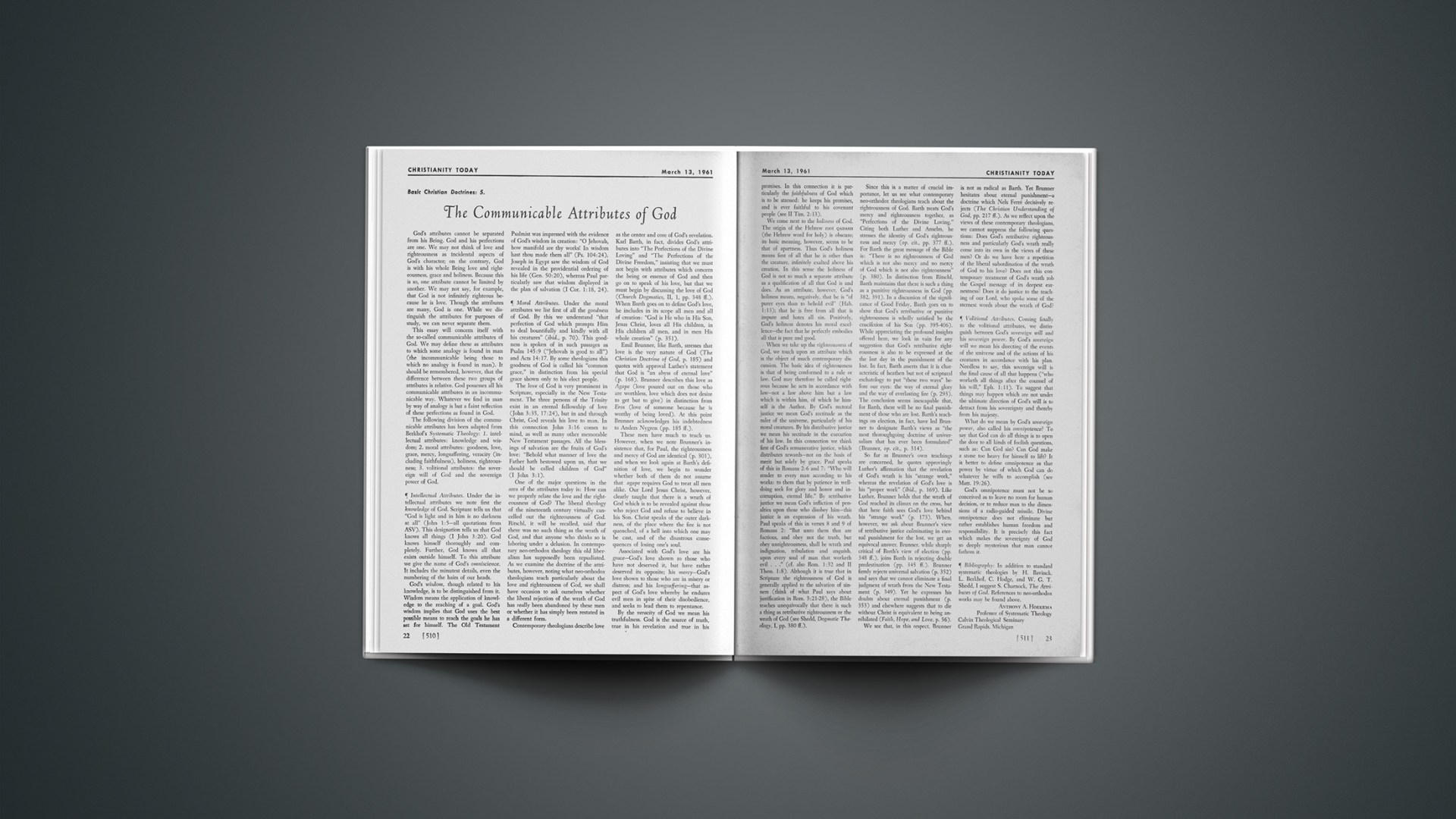God’s attributes cannot be separated from his Being. God and his perfections are one. We may not think of love and righteousness as incidental aspects of God’s character; on the contrary, God is with his whole Being love and righteousness, grace and holiness. Because this is so, one attribute cannot be limited by another. We may not say, for example, that God is not infinitely righteous because he is love. Though the attributes are many, God is one. While we distinguish the attributes for purposes of study, we can never separate them.
This essay will concern itself with the so-called communicable attributes of God. We may define these as attributes to which some analogy is found in man (the incommunicable being those to which no analogy is found in man). It should be remembered, however, that the difference between these two groups of attributes is relative. God possesses all his communicable attributes in an incommunicable way. Whatever we find in man by way of analogy is but a faint reflection of these perfections as found in God.
The following division of the communicable attributes has been adapted from Berkhof’s Systematic Theology: 1. intellectual attributes: knowledge and wisdom; 2. moral attributes: goodness, love, grace, mercy, longsuffering, veracity (including faithfulness), holiness, righteousness; 3. volitional attributes: the sovereign will of God and the sovereign power of God.
Intellectual Attributes. Under the intellectual attributes we note first the knowledge of God. Scripture tells us that “God is light and in him is no darkness at all” (John 1:5—all quotations from ASV). This designation tells us that God knows all things (1 John 3:20). God knows himself thoroughly and completely. Further, God knows all that exists outside himself. To this attribute we give the name of God’s omniscience. It includes the minutest details, even the numbering of the hairs of our heads.
God’s wisdom, though related to his knowledge, is to be distinguished from it. Wisdom means the application of knowledge to the reaching of a goal. God’s wisdom implies that God uses the best possible means to reach the goals he has set for himself. The Old Testament Psalmist was impressed with the evidence of God’s wisdom in creation: “O Jehovah, how manifold are thy works! In wisdom hast thou made them all” (Ps. 104:24). Joseph in Egypt saw the wisdom of God revealed in the providential ordering of his life (Gen. 50:20), whereas Paul particularly saw that wisdom displayed in the plan of salvation (1 Cor. 1:18, 24).
Moral Attributes. Under the moral attributes we list first of all the goodness of God. By this we understand “that perfection of God which prompts Him to deal bountifully and kindly with all his creatures” (ibid., p. 70). This goodness is spoken of in such passages as Psalm 145:9 (“Jehovah is good to all”) and Acts 14:17. By some theologians this goodness of God is called his “common grace,” in distinction from his special grace shown only to his elect people.
The love of God is very prominent in Scripture, especially in the New Testament. The three persons of the Trinity exist in an eternal fellowship of love (John 3:35; 17:24), but in and through Christ, God reveals his love to man. In this connection John 3:16 comes to mind, as well as many other memorable New Testament passages. All the blessings of salvation are the fruits of God’s love: “Behold what manner of love the Father hath bestowed upon us, that we should be called children of God” (1 John 3:1).
One of the major questions in the area of the attributes today is: How can we properly relate the love and the righteousness of God? The liberal theology of the nineteenth century virtually cancelled out the righteousness of God. Ritschl, it will be recalled, said that there was no such thing as the wrath of God, and that anyone who thinks so is laboring under a delusion. In contemporary neo-orthodox theology this old liberalism has supposedly been repudiated. As we examine the doctrine of the attributes, however, noting what neo-orthodox theologians teach particularly about the love and righteousness of God, we shall have occasion to ask ourselves whether the liberal rejection of the wrath of God has really been abandoned by these men or whether it has simply been restated in a different form.
Contemporary theologians describe love as the center and core of God’s revelation. Karl Barth, in fact, divides God’s attributes into “The Perfections of the Divine Loving” and “The Perfections of the Divine Freedom,” insisting that we must not begin with attributes which concern the being or essence of God and then go on to speak of his love, but that we must begin by discussing the love of God (Church Dogmatics, II, 1, pp. 348 ff.). When Barth goes on to define God’s love, he includes in its scope all men and all of creation: “God is He who in His Son, Jesus Christ, loves all His children, in His children all men, and in men His whole creation” (p. 351).
Emil Brunner, like Barth, stresses that love is the very nature of God (The Christian Doctrine of God, p. 185) and quotes with approval Luther’s statement that God is “an abyss of eternal love” (p. 168). Brunner describes this love as Agape (love poured out on those who are worthless, love which does not desire to get but to give) in distinction from Eros (love of someone because he is worthy of being loved). At this point Brunner acknowledges his indebtedness to Anders Nygren (pp. 185 ff.).
These men have much to teach us. However, when we note Brunner’s insistence that, for Paul, the righteousness and mercy of God are identical (p. 301), and when we look again at Barth’s definition of love, we begin to wonder whether both of them do not assume that agape requires God to treat all men alike. Our Lord Jesus Christ, however, clearly taught that there is a wrath of God which is to be revealed against those who reject God and refuse to believe in his Son. Christ speaks of the outer darkness, of the place where the fire is not quenched, of a hell into which one may be cast, and of the disastrous consequences of losing one’s soul.
Associated with God’s love are his grace—God’s love shown to those who have not deserved it, but have rather deserved its opposite; his mercy—God’s love shown to those who are in misery or distress; and his longsuffering—that aspect of God’s love whereby he endures evil men in spite of their disobedience, and seeks to lead them to repentance.
By the veracity of God we mean his truthfulness. God is the source of truth, true in his revelation and true in his promises. In this connection it is particularly the faithfulness of God which is to be stressed: he keeps his promises, and is ever faithful to his covenant people (see 2 Tim. 2:13).
We come next to the holiness of God. The origin of the Hebrew root QADASH (the Hebrew word for holy) is obscure; its basic meaning, however, seems to be that of apartness. Thus God’s holiness means first of all that he is other than the creature, infinitely exalted above his creation. In this sense the holiness of God is not so much a separate attribute as a qualification of all that God is and does. As an attribute, however, God’s holiness means, negatively, that he is “of purer eyes than to behold evil” (Hab. 1:13); that he is free from all that is impure and hates all sin. Positively, God’s holiness denotes his moral excellence—the fact that he perfectly embodies all that is pure and good.
When we take up the righteousness of God, we touch upon an attribute which is the object of much contemporary discussion. The basic idea of righteousness is that of being conformed to a rule or law. God may therefore be called righteous because he acts in accordance with law—not a law above him but a law which is within him, of which he himself is the Author. By God’s rectoral justice we mean God’s rectitude as the ruler of the universe, particularly of his moral creatures. By his distributive justice we mean his rectitude in the execution of his law. In this connection we think first of God’s remunerative justice, which distributes rewards—not on the basis of merit but solely by grace. Paul speaks of this in Romans 2:6 and 7: “Who will render to every man according to his works: to them that by patience in welldoing seek for glory and honor and incorruption, eternal life.” By retributive justice we mean God’s infliction of penalties upon those who disobey him—this justice is an expression of his wrath. Paul speaks of this in verses 8 and 9 of Romans 2: “But unto them that are factious, and obey not the truth, but obey unrighteousness, shall be wrath and indignation, tribulation and anguish, upon every soul of man that worketh evil …” (cf. also Rom. 1:32 and 2 Thess. 1:8). Although it is true that in Scripture the righteousness of God is generally applied to the salvation of sinners (think of what Paul says about justification in Rom. 3:21–28), the Bible teaches unequivocally that there is such a thing as retributive righteousness or the wrath of God (see Shedd, Dogmatic Theology, I, pp. 380 ff.).
Since this is a matter of crucial importance, let us see what contemporary neo-orthodox theologians teach about the righteousness of God. Barth treats God’s mercy and righteousness together, as “Perfections of the Divine Loving.” Citing both Luther and Anselm, he stresses the identity of God’s righteousness and mercy (op. cit., pp. 377 ff.). For Barth the great message of the Bible is: “There is no righteousness of God which is not also mercy and no mercy of God which is not also righteousness” (p. 380). In distinction from Ritschl, Barth maintains that there is such a thing as a punitive righteousness in God (pp. 382, 391). In a discussion of the significance of Good Friday, Barth goes on to show that God’s retributive or punitive righteousness is wholly satisfied by the crucifixion of his Son (pp. 395–406). While appreciating the profound insights offered here, we look in vain for any suggestion that God’s retributive righteousness is also to be expressed at the the last day in the punishment of the lost. In fact, Barth asserts that it is characteristic of heathen but not of scriptural eschatology to put “these two ways” before our eyes: the way of eternal glory and the way of everlasting fire (p. 293). The conclusion seems inescapable that, for Barth, there will be no final punishment of those who are lost. Barth’s teachings on election, in fact, have led Brunner to designate Barth’s views as “the most thoroughgoing doctrine of universalism that has ever been formulated” (Brunner, op. cit., p. 314).
So far as Brunner’s own teachings are concerned, he quotes approvingly Luther’s affirmation that the revelation of God’s wrath is his “strange work,” whereas the revelation of God’s love is his “proper work” (ibid., p. 169). Like Luther, Brunner holds that the wrath of God reached its climax on the cross, but that here faith sees God’s love behind his “strange work” (p. 173). When, however, we ask about Brunner’s view of retributive justice culminating in eternal punishment for the lost, we get an equivocal answer. Brunner, while sharply critical of Barth’s view of election (pp. 348 ff.), joins Barth in rejecting double predestination (pp. 345 ff.). Brunner firmly rejects universal salvation (p. 352) and says that we cannot eliminate a final judgment of wrath from the New Testament (p. 349). Yet he expresses his doubts about eternal punishment (p. 353) and elsewhere suggests that to die without Christ is equivalent to being annihilated (Faith, Hope, and Love, p. 56).
We see that, in this respect, Brunner is not as radical as Barth. Yet Brunner hesitates about eternal punishment—a doctrine which Nels Ferré decisively rejects (The Christian Understanding of God, pp. 217 ff.). As we reflect upon the views of these contemporary theologians, we cannot suppress the following questions: Does God’s retributive righteousness and particularly God’s wrath really come into its own in the views of these men? Or do we have here a repetition of the liberal subordination of the wrath of God to his love? Does not this contemporary treatment of God’s wrath rob the Gospel message of its deepest earnestness? Does it do justice to the teaching of our Lord, who spoke some of the sternest words about the wrath of God?
Volitional Attributes. Coming finally to the volitional attributes, we distinguish between God’s sovereign will and his sovereign power. By God’s sovereign will we mean his directing of the events of the universe and of the actions of his creatures in accordance with his plan. Needless to say, this sovereign will is the final cause of all that happens (“who worketh all things after the counsel of his will,” Eph. 1:11). To suggest that things may happen which are not under the ultimate direction of God’s will is to detract from his sovereignty and thereby from his majesty.
What do we mean by God’s sovereign power, also called his omnipotence? To say that God can do all things is to open the door to all kinds of foolish questions, such as: Can God sin? Can God make a stone too heavy for himself to lift? It is better to define omnipotence as that power by virtue of which God can do whatever he wills to accomplish (see Matt. 19:26).
God’s omnipotence must not be so conceived as to leave no room for human decision, or to reduce man to the dimensions of a radio-guided missile. Divine omnipotence does not eliminate but rather establishes human freedom and responsibility. It is precisely this fact which makes the sovereignty of God so deeply mysterious that man cannot fathom it.
Bibliography: In addition to standard systematic theologies by H. Bavinck, L. Berkhof, C. Hodge, and W. G. T. Shedd, I suggest S. Charnock, The Attributes of God. References to neo-orthodox works may be found above.
Professor of Systematic Theology
Calvin Theological Seminary
Grand Rapids. Michigan










